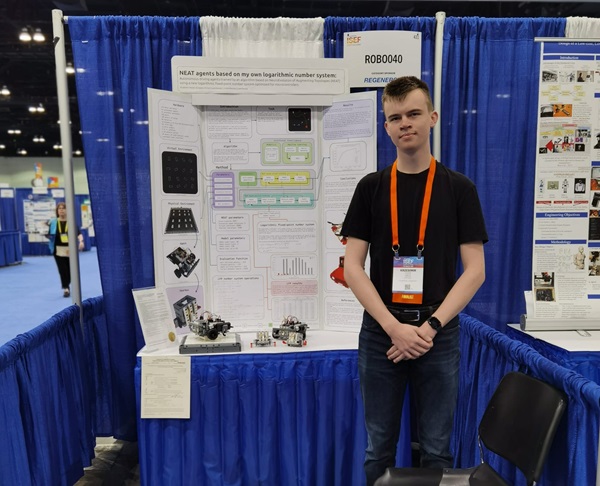 Krzesimir Hyżyk on his booth at ISEF;
Credit: Fondation Jeunes Scientifiques Luxembourg
Krzesimir Hyżyk on his booth at ISEF;
Credit: Fondation Jeunes Scientifiques Luxembourg
On Wednesday 22 May 2024, the Fondation Jeunes Scientifiques Luxembourg (FJSL) announced that eighteen-year-old Krzesimir Hyżyk, a secondary school student from the European School Luxembourg I, made Luxembourg proud at the Regeneron International Science and Engineering Fair (ISEF) – the world's largest contest for young scientists.
This young computer and engineering prodigy secured the third prize in the “Robotics & Intelligent Machines” category and returned home from Los Angeles with $1,000 in his pocket.
Krzesimir is very familiar with these types of competitions for pre-university students, FJSL noted, and is a veteran of Luxembourg's young scientists. With six consecutive appearances at the national Jonk Fuerscher competition to his credit, his impressive international record before the American ISEF competition included already notable performances at the Chinese CASTIC and Taiwanese TISF competitions.
In March 2024, during the Luxembourg competition, he had enchanted the jury with a highly sophisticated research & development project, carried out entirely outside of school and without any external help, entitled “Autonomous driving agents trained by an algorithm based on NeuroEvolution of Augmenting Topologies (NEAT) using a new logarithmic fixed-point number system optimised for microcontrollers”.
In short, Krzesimir built a fleet of sixteen small autonomous vehicles, controlled by a customised artificial intelligence, which was trained to avoid collisions both on the physical system itself and, upstream, on a virtual clone of the system. All this was achieved with extremely cheap hardware, which led him to optimise the limited computing power of his on-board computers (or “microcontrollers”). So, to reduce computation times (a prerequisite for avoiding accidents in an autonomous vehicle) Krzesimir developed a new logarithmic number system which, on its own, could have earned his project a place in the “mathematics” category of any competition, FJSL added.
This ingenious logarithmic system did not escape the attention of the ISEF jury, who praised its originality and efficiency. This jury had to examine the projects of 1,699 candidates from all over the world, including 102 in the “Robotics & Intelligent Machines” category, all of whom gathered at the LA Convention Center from 11 to 17 May 2024. Note that only 20% of entrants win a 1st, 2nd or 3rd Grand Award each year, which makes Krzesimir's performance all the more commendable.
However, Luxembourg’s candidate's week began with a few cold sweats, as the incidents at the Luxembourg airport on 10 May delayed the arrival of his luggage, including his precious prototypes. After many ups and downs, the latter finally arrived just in time for the inspection of his booth by the “security review committee” and, in the process, the parade of interviews (seven in all) with the jury. A private visit for all participants to Universal Studios Hollywood, in the middle of the week, took some of the pressure off before the closing ceremony, which ended with the aforementioned success.
The prize money ($1,000) will be used to develop his next research project, which will combine robotics and notions of quantum physics.








